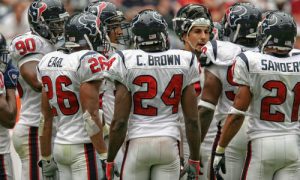For years, as Netflix, Hulu, Amazon Prime and over-the-top (OTT) streaming services have upended the world of film and television, live sports broadcasts have remained firmly entrenched on more traditional cable and network platforms. The tide, however, is finally turning. Steaming services are looking for new ways to get subscribers while major sports leagues in the U.S. and beyond look to capitalize on new ways to get their live content in front of viewers.
Those two forces are combining to form a major–and costly–shift in media rights from cable channels to streaming platforms that business journalists covering that sector should be aware of. Nowhere will that be more apparent this year than in the most popular sports league in the U.S.–the NFL.
The biggest shift yet in live sports broadcast rights is set to take place next NFL season when Amazon Prime will become the exclusive broadcast rights holder of the league’s midweek showcase, Thursday Night Football. The 11-year, $1 billion-per-year contract was recently officially announced by both parties:
Amazon’s payment for the Thursday Night Football package is nearly double the NFL’s previous contract with Fox Sports for the midweek game. That deal only lasted four seasons, with Fox paying just $660 million per year for the TNF rights.
The new rights deal marks the first time the NFL has agreed to show regular primetime games exclusively on a streaming platform. Amazon has been streaming Thursday Night Football since 2017, but the games have also been broadcast on the NFL Network cable channel as well as a traditional network partner like CBS, NBC or Fox.
New revenue streams for sports leagues
Given that the NFL is also by far the most popular professional sports league in the U.S., its willingness to allow a major weekly primetime game to be shown exclusively on a streaming platform marks a sea change for the entire live sports industry, according to longtime sports media executive and current Arizona State University faculty associate Todd Merkow.
“We have a problem with cord-cutting,” Merkow said. “As we’re seeing the middle man (the cable operators and the satellite operators) kind of pushed out… where are leagues and teams going to be able to pick up that media rights revenue? If the ‘FAANGs’–Facebook, Apple, Amazon, Netflix, Google–come into the space and want that type of programming, then we’re going to have a better chance of keeping these trends of the media rights revenue growth happening than otherwise.”
If the NFL’s most recent round of media rights negotiations was any indication, that trend of revenue growth is very strong. With the Amazon deal included alongside the league’s recently renewed contracts with longtime partners CBS, NBC, ESPN/ABC, and Fox, the NFL’s annual media rights revenue will jump to roughly $10 billion per year from $5.9 billion per year, according to the Associated Press.
New ways to watch
Amazon has already experimented with taking advantage of a digital broadcast format over the past few seasons. Viewers have the option of choosing different telecasts of each game, including one from longtime sports television commentators Hannah Storm and Andrea Kremer that stands as the only female announcing duo to call a major men’s team sport. Amazon also has an “X-Ray vision” viewing option on certain platforms that allow fans to see live statistics, written analysis, and insights on teams and players alongside the game.
But Amazon wants its product to have the gravitas and legitimacy of other prime-time NFL broadcasts, something that Thursday Night Football has struggled with since its debut in 2006. To do so, Amazon has hired longtime Sunday Night Football producer Fred Gaudelli away from NBC, and it has been reported for months that Al Michaels–one of the most accomplished play-by-play broadcasters of all time–will likely join him in the move to Amazon, with a contract that could reportedly pay Michaels as much as $11 million per year according to the New York Post. (Michaels hinted during the Feb. 13 Super Bowl 56 broadcast on NBC that it would be his last game with the network.)
“I think [Amazon’s] got to get the older demographic to shift, and getting them to shift away from broadcast television is difficult,” Merkow said. “We’re looking at a world today where we’ve got penetration with Amazon Prime and Netflix and even Apple TV+ that are penetrated fairly high in the homes across America, but getting viewers and fans to convert into a more frequent usage of those, you’re going to have to bring some familiarity and bringing out Michaels who’s obviously one of the greatest play-by-play guys, bringing him over I think does that.”
However, some fans will still be able to access the game’s broadcast over the airwaves. In order to fulfill rights obligations, the NFL is required to simulcast Thursday Night Football on network affiliates in a team’s local markets. For instance, if the New England Patriots are playing the Arizona Cardinals on a Thursday Night Football game, the game might be shown on WBTS in Boston and KPHO-TV in Phoenix, and exclusively on Amazon Prime everywhere else.
NFL Sunday Ticket
Another NFL broadcast staple may soon follow Thursday Night Football’s flip to streaming. According to reports from veteran sports business insiders Daniel Kaplan of The Athletic and Andrew Marchand of The New York Post, there is mutual interest between the NFL and Apple for the league’s NFL Sunday Ticket out-of-market broadcast package, which has been hosted on DirecTV since its inception in the 1990s.
NFL Sunday Ticket allows fans to view any game that is not being broadcast locally in their home market or on national television. The wildly popular product allows fans who live far away from their favorite teams, such as a Green Bay Packers fan in Los Angeles or a Pittsburgh Steelers fan in Phoenix, to watch that team no matter when and on what network they are playing. If Apple does secure Sunday Ticket rights, which could cost over $2 billion per year according to Kaplan, it would likely join the package with its Apple TV+ streaming service.
There is already a streaming portion to Sunday Ticket – it has been available a la carte online to non-DirecTV subscribers since 2009, but at a significantly higher price than what DirecTV subscribers pay for the exact same service. Marchand, Kaplan, and several other sports business journalists have reported that the NFL would be interested in completely retooling Sunday Ticket–the current version of which has been criticized in recent years–to take full advantage of the flexibility that digital streaming offers.
Potential innovations that could come to Sunday Ticket in that scenario include multi-layered viewing like Amazon’s X-Ray vision, the ability to watch multiple games simultaneously, and tiered levels of subscription that could entice fans who only want to watch a certain team but do not want to pay for the entire service.
The Existing Partners
The NFL’s longtime relationships with CBS, Fox, NBC, and ABC/ESPN/Disney are not going anywhere, and those four networks will continue to broadcast the bulk of NFL games year in and year out.
But CBS, NBC, and ESPN have all debuted OTT streaming platforms of their own in recent years. Locally broadcast CBS games, as well as NBC’s Sunday Night Football games, are now available to stream on Paramount+ and Peacock, respectively, without an accompanying cable subscription or network TV receiver. As part of their new contracts with the NFL, NBC and ESPN will also exclusively broadcast a small handful of Sunday Night Football and Monday Night Football games on their respective streaming services, according to the Sports Business Journal.
Additionally, CBS, NBC, and ESPN have developed new NFL-centric studio shows or migrated shows from other platforms exclusively for their streaming services.
The one thing that’s been consistent over time is that sports drives distribution,” Merkow said. “Sports drives acquiring eyeballs, and they’re now realizing that and figuring it out… That’s why I think we’ll see Sunday Ticket somewhere else. I think that’s why we’ll see Major League Baseball’s out-of-market streaming package somewhere else on these streaming platforms because they drive acquisition of eyeballs and they drive acquisition of subscribers.”
Local revenue
Due to its popularity, the NFL rakes in a massive and steadily increasing national revenue total, which primarily comes from TV viewership and league-wide sponsorships. That total is divided evenly between its 32 teams. Even though the NFL is a private entity, the Green Bay Packers are a publicly sold nonprofit organization that produces an earnings release to its shareholders at the end of each fiscal year–including their cut of national revenue–giving the public a glimpse into the primary cash flow of the league as a whole. According to data from Green Bay’s fiscal year 2021 earnings report, the team received $309.2 million in its cut of national revenue, meaning that the NFL generated $9.89 billion of national revenue in total, per Daniel Kaplan of The Athletic. However, local revenue – which each team makes individually through things like ticket and merchandise sales, fell sharply for the Packers in FY 2021 due to the COVID-19 pandemic. That is believed to reflect a league-wide trend, and Kaplan estimates that NFL teams lost a collective $4 billion in local revenue in FY 2021.











